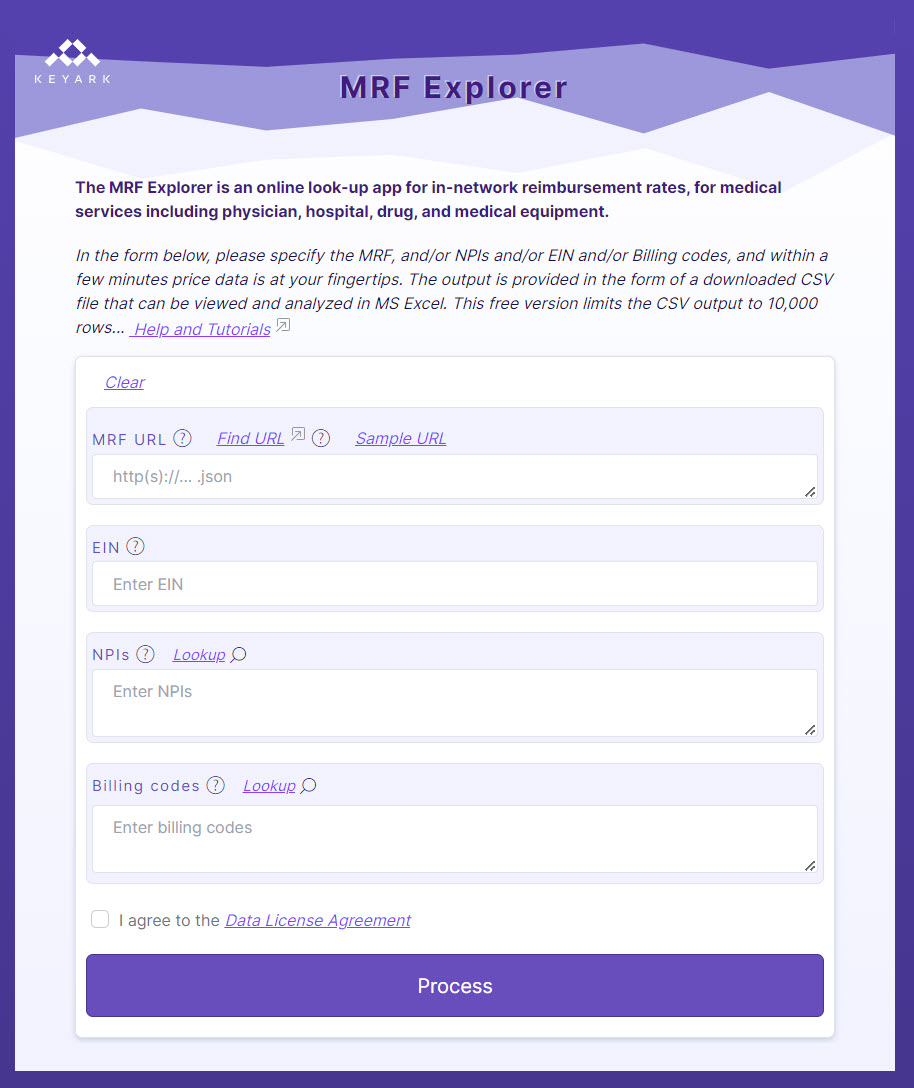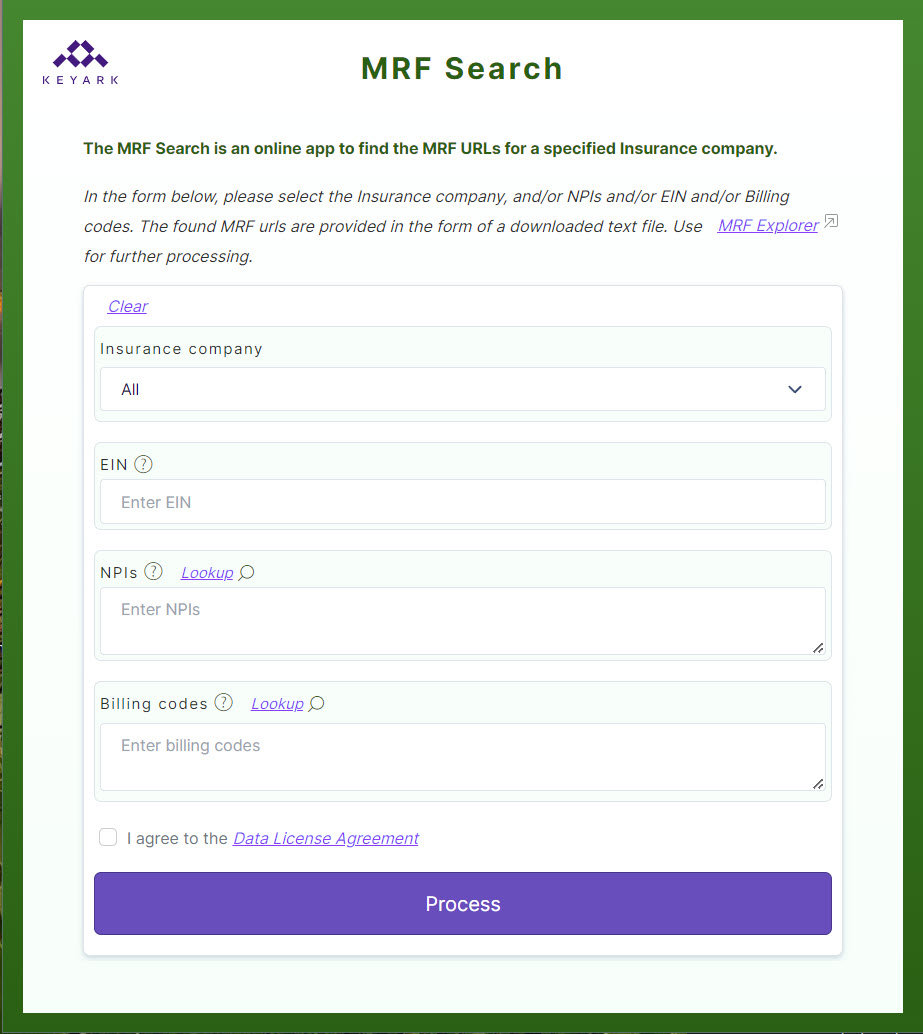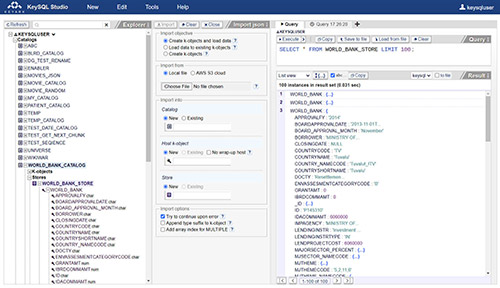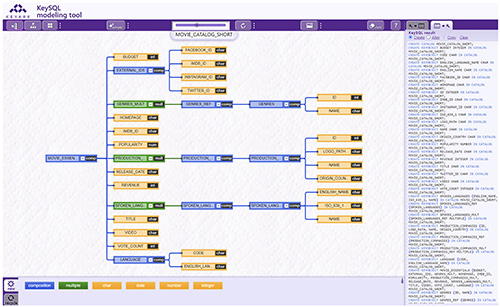SQL, NoSQL, JSON, BSON, MongoDB, Cassandra, Data model, Database, Query, KeySQL, JSON SCHEMA, Semi-structured data, non-relational data, unstructured data, multi-model database, flexible schema, MongoDB Atlas, Pentaho, Alteryx, MONGOOSE, Power Query JSON
Power Query JSON
MongoDB
Atlas
Cassandra
Pentaho
Alteryx
MongoDB
BSON
JSON SCHEMA
KeySQL
SQL JSON
NoSQL
Non-relational data
Unstructured data
Data model
Flexible schema Query Database
Multi-model database
Semi-structuredd data
Mission
Keyark develops KeySQL technology enabling a productivity breakthrough in handling of non-flat data comparable to the breakthrough achieved by E.F.Codd’s relational model and SQL for flat data.
What is KeySQL?
KeySQL is a structured query language that employs a keyobject (k-object) data model. The keyobjects work as data definitions for the k-object instances, which represent the data itself.
KeySQL comprises the same high-level data manipulation statements SQL does. At the same time, it can handle data of any complexity.
KeySQL breakthrough features
Universal data model founded in math structure of hereditarily-finite sets
Business friendly bottom up data definition
Data objects of any complexity
Flexible schema
Entity-level queries
Structural data transformations
Grouping objects by objects
KeySQL Technology Use Cases
- JSON Analytics
with KeySQL
Organizations collect massive amounts of JSON data, however this data is not available for ad hoc analytics, as analysts lack suitable tools or programming expertise. We show how an analyst with basic SQL skills can be highly productive with JSON data. These examples are based on a sample JSON data set that is popular in the MongoDB world.
- MRF
Explorer
MRF Explorer is an online service, that makes healthcare price-transparency data accessible to everyone.
The purpose of MRF Explorer is to provide MRF data as a CSV file that can be viewed and analyzed in Excel. You can narrow the data to specified EINs, NPIs and Billing codes.
For the first time patients and all stakeholders in the medical industry gain access to contractual rates for medical services and drug pricing that until recently was hidden in secret contracts.
- MRF Search
The purpose of MRF Search is to find the MRF URLs for a specified insurance company.
MRF Search can be useful as a supplement to MRF Explorer or on its own.
You can narrow your search results to specified EINs, NPIs and Billing codes.
- KeySQL vs MongoDB
MongoDB
MongoDB is a popular system for storing and processing JSON formatted files. It does not presume any logical structure of the data in the files or automatically verify the data consistency. MongoDB makes it easy to load the files but not as easy to query them. It is oriented mostly towards programmers who must know the expected logical structure of the data and deal with the data quality issues with application code. Though MongoDB provides a set of data processing functions, they require a programmer’s mindset and productivity is low compared to SQL. Typically, a page of code must be produced to express a SQL statement of just several lines.
Summarizing, MongoDB facilitates efficient ingestion of JSON, but, unlike SQL, is not suitable for ad hoc querying or analysis of the data.
vs
KeySQL
Rather than dealing with files, KeySQL follows the SQL database paradigm but employs a more general key-object data model allowing for objects of arbitrary complexity. Particularly, the conversion between JSON and key-object instances is easy and straightforward. KeySQL employs the same SELECT, INSERT, UPDATE, and DELETE transactional statements as SQL, but they are applied to key-object stores rather than flat tables. There are several additional statements and options necessary for restructuring, joining, and grouping of complex data which have no analog in standard SQL, as SQL deals exclusively with a simpler table data structure.
Thus, KeySQL provides a universal data platform naturally integrating the processing of all SQL and NoSQL data sources.
- ... more to come
KeySQL Scalable Cloud Platform
KeySQL platform is built for the cloud and supports a variety of client applications.

 KeySQL Server
KeySQL Server
KeySQL Server is a parallel and scalable high-performance transactional engine supporting k-object data model and written in C++. Its transparent and replaceable data storage is currently formed by industry leading and open-source databases supporting standard SQL. The server can work with several heterogeneous databases at the same time, providing a performant scalable data layer over a plurality of otherwise non-scalable SQL databases. Other types of data storage will be added in the future.
Included in docker image
KeySQL Studio
KeySQL Studio is a web application that runs in all popular browsers. Studio provides an elegant user interface for analyst and administrator interaction with KeySQL Server. Studio’s import function makes for easy loading of JSON/BSON, CSV, and XML data. There is no need to define the data structure before import, or to perform complicated ETL or ELT. Studio can automatically recognize the schema of your JSON/BSON data, including the data type, repeating values, and arrays. Upon import the structure of your data is easily viewed and navigated via the Studio Explorer, a tree-like display of the data structure. Due to the Flexible Schema of the KeySQL Universal Database, import can ingest both flat and non-flat data, including variations in the structure of data, providing flexibility similar to that of document databases. Studio’s export function makes for easy sharing of data. Data can be exported using JSON, native KeySQL format, CSV, or XML. Administration is easy, using an intuitive graphical interface to manage user accounts, check and set permissions, and create new schemas. The user interface for command execution is friendly for data analysts, with features such as automatic capture of command history, pre-built KeySQL snippets, and online help.
Included in docker image
Data Modeling Tool
The KeySQL Data Modeling Tool is a state-of-the-art web application for modeling complex, non-flat data. It is useful for:
- Design and revision of non-flat data models
- Creation of KeySQL catalogs with their k-objects
- Documenting and sharing data models via on-screen and printed JPEG and SVG diagrams
- Deciphering the schema of complex data, whether it be from JSON, XML, MongoDB or other NoSQL databases
The Data Modeling Tool can be run stand-alone but works in tandem with KeySQL Studio to deliver additional functionality.
Not included in docker image
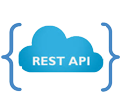 REST API
REST API
The KeySQL REST API is a standard API that supports HTTP requests for accessing KeySQL Server. A wide range of Business Intelligence tools such as Power BI can directly query KeySQL Server via this API. In addition, this API can be used to rapidly move data between KeySQL Server and databases, data lakes, and proprietary systems.
Included in docker image
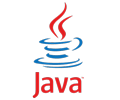 KeySQL Java SDK
KeySQL Java SDK
Java developers are provided with a Java SDK and driver fully supported by Keyark. Novice developers can compose commands in KeySQL Studio, such as “SELECT Name, Email FROM Contacts”, embed this code into a single Java statement, and fetch the result set, with only a few lines of simple code.
Published in Maven repository
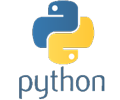 KeySQL Python SDK
KeySQL Python SDK
Python developers are provided with a Python SDK and driver fully supported by Keyark. The SDK is similar to the Java SDK, providing both a friendly environment for novice developers as well as a sophisticated class library for more advanced developers.
Windows / Linux / MAC installer
KeySQL® Technology Value Proposition
Universal Database for Both Flat and Non-flat Data
- Patent pending Composable Data Model
- KeySQL - a next generation SQL language native to both non-flat and flat data
- No impedance mismatch: object-relational mapping is all but eliminated
- Single-query access to variably structured data with Flexible Schema
- Data objects of arbitrary complexity
- Entity-level queries
- Valuable non-flat data can be leveraged by data analysts
Data Modeling Dramatically Simplified
- Business-friendly bottom-up data definition makes data modeling a breeze
- Logical data model complexity is drastically reduced compared to RDBMS
- No physical data modeling whatsoever
- Non-flat data is not hidden in blobs but is natively defined and queried in KeySQL
- KeySQL data catalogs facilitate data exploration
- JSON, CSV, and XML is imported to KeySQL without prior data modeling
Organization-wide Productivity Gains
- Non-flat data is available to data analysts without dependence on Java, Python, or other programmers
- BI reporting from non-flat data is direct and does not require intermediate RDBMS staging
- Non-flat data can be directly streamed to machine learning software
- Business users fluent in SQL can grasp bulk of KeySQL in just a couple of days
- Data scientists and engineers can focus on project work, freed from incessant support of data analysts
Keyark in the news
KeySQL and Big Data
 Databases for Non-Flat World: Keyark Publishes New-Generation KeySQL Database Technology
FOSTER CITY, Calif. June 26, 2024 (Newswire.com) - Silicon Valley startup Keyark, Inc. has released its new-generation KeySQL database technology, enabling non-programmers to efficiently analyze fast-growing volumes of complex data, including JSON file collections, accumulated by organizations in recent years.This non-flat data does not fit comfortably within flat SQL databases, and consequently, is handled poorly and queried with great effort...
continue reading
Databases for Non-Flat World: Keyark Publishes New-Generation KeySQL Database Technology
FOSTER CITY, Calif. June 26, 2024 (Newswire.com) - Silicon Valley startup Keyark, Inc. has released its new-generation KeySQL database technology, enabling non-programmers to efficiently analyze fast-growing volumes of complex data, including JSON file collections, accumulated by organizations in recent years.This non-flat data does not fit comfortably within flat SQL databases, and consequently, is handled poorly and queried with great effort...
continue reading

 Simplifying Big Data, How Keyark Allows Non-Programmers to Analyze
Complex Data
SAN MATEO, CA / February 9, 2023 / The
complexity of data management and data analytics increases day by day as the amount of data grows
significantly. One of the serious issues faced by organizations is the decreasing productivity of data
analysis due to the fast-growing volume of complex non-flat data, such as JSON or XML. In response to
this challenge, Keyark, a Silicon Valley software and technology development firm, has developed the
novel KeySQL technology...
continue reading
Simplifying Big Data, How Keyark Allows Non-Programmers to Analyze
Complex Data
SAN MATEO, CA / February 9, 2023 / The
complexity of data management and data analytics increases day by day as the amount of data grows
significantly. One of the serious issues faced by organizations is the decreasing productivity of data
analysis due to the fast-growing volume of complex non-flat data, such as JSON or XML. In response to
this challenge, Keyark, a Silicon Valley software and technology development firm, has developed the
novel KeySQL technology...
continue reading
 SQL for NoSQL Data
DEC 13, 2021 / BY DAVE WELLS DATA
MANAGEMENT/ Tableau, Qlik, Power BI, and other self-service tools are great for easy, code-free data
analysis and visualization. But sometimes, you want to get close to the data and work with it more
directly. Today’s business organizations often have data-savvy people who are comfortable and
productive working directly with data and whose data goals are not limited to producing visualizations
and dashboards...
continue reading
SQL for NoSQL Data
DEC 13, 2021 / BY DAVE WELLS DATA
MANAGEMENT/ Tableau, Qlik, Power BI, and other self-service tools are great for easy, code-free data
analysis and visualization. But sometimes, you want to get close to the data and work with it more
directly. Today’s business organizations often have data-savvy people who are comfortable and
productive working directly with data and whose data goals are not limited to producing visualizations
and dashboards...
continue reading
MRF Explorer


 Keyark Announces the Launch of Its MRF Explorer as the Leading Tool
for Healthcare Price Transparency
SAN MATEO, CA / February 8, 2023 /
Silicon Valley software and technology development firm, Keyark, announces the launch of its MRF
(Machine-Readable File) data explorer. MRF Explorer is an online service that makes healthcare
price-transparency data accessible to everyone. This self-service facility helps consumers,
self-insured employers and industry analysts better understand the costs associated with healthcare.
This is the first time all stakeholders in the medical industry get access to contractual rates for
medical services and drug pricing that until recently was hidden in secret contracts...
continue
reading
Keyark Announces the Launch of Its MRF Explorer as the Leading Tool
for Healthcare Price Transparency
SAN MATEO, CA / February 8, 2023 /
Silicon Valley software and technology development firm, Keyark, announces the launch of its MRF
(Machine-Readable File) data explorer. MRF Explorer is an online service that makes healthcare
price-transparency data accessible to everyone. This self-service facility helps consumers,
self-insured employers and industry analysts better understand the costs associated with healthcare.
This is the first time all stakeholders in the medical industry get access to contractual rates for
medical services and drug pricing that until recently was hidden in secret contracts...
continue
reading


